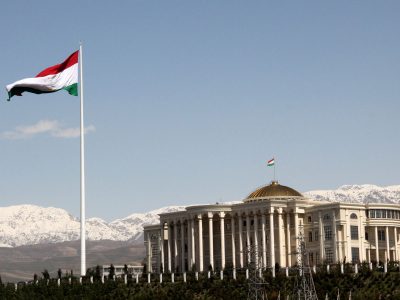
Daler Imomali (in the middle), a famous Tajik blogger, in his YouTube video about problems customers have at one of the banks in the country. Screenshot from Daler Imomali‘s YouTube channel. Fair use.
On August 10, a member of Tajikistan’s parliament Manuchehr Hamidzod published a draft law on the activity of bloggers on his personal Facebook page. The law’s stated goal is to regulate public relations in blogging activities and determine the legal basis and the procedure for organizing and promoting blogging activities, as well as the rights and obligations of bloggers. In the comments section under the post, Hamidzod invited his fellow citizens to submit their thoughts and proposals for improving and finalizing the draft law in the following 10 days.
Here is the Facebook post with the draft law on the activity of bloggers.
The initial reaction to the law came on the day of its publication from the journalist Makhropa Kiromova, who called the draft law’s several provisions “so illogical” and “so destructive.” Kiromova drew attention to the fact that the law makes bloggers responsible for comments under posts instead of the authors of those comments. Article 9 obliges bloggers to monitor comments under their publications to make sure there are no obscene words, degrading proposals, or calls for illegal actions. She contemplated its possible harmful effect by stating: “It’s hard for me to imagine what can happen to bloggers who have several hundred or thousands of comments under their posts.”
Here is a Facebook post with Kiromova's feedback on the draft law.
Kiromova noted that the law’s destructive aspect is in Article 13, which is related to the procedure of terminating blogging activities. It stipulates that a blogger’s account can be forcibly removed within 24 hours without the possibility of recovery if the bloggers and their content do not meet the requirements specified in the bill. According to her, these requirements are “mostly abstract” and open the door to deleting the channels and pages of journalists and bloggers critical of the government, especially those who are currently imprisoned.
Kiromova is not alone in her criticism of the bill. The comments section under Hamidzod’s Facebook post with the draft law is full of critical statements that range from calls to outright drop it to comments questioning specific articles and clauses. Those who oppose its adoption argue that it will kill Tajikistan’s nascent blogging industry by placing restrictions and control on bloggers. They also note that the current legal framework is sufficient to regulate the blogging industry.
Another group of citizens questioned the bill’s ban on using dialect and obliging bloggers to use only the literary and official version of Tajik language. Another clause that raised eyebrows is the proposal to provide tax breaks to those bloggers who produce content related to politics, economy, science, education, and tourism in Tajikistan. Starting from 2021, all bloggers in Tajikistan are obliged to register with tax authorities and pay taxes.
Not much is known about the fate of the draft bill. There is no information about what changes were introduced on the basis of the feedback from the public. According to Hamidzod, it “is undergoing examination in the relevant ministries and departments, where it will be given a legal assessment in the manner prescribed by law.” However, there is more reason to be pessimistic rather than optimistic in the political context of Tajikistan.
In the last few years, the country has recorded significant backsliding with regards to freedom of expression as well as overall political freedoms. In 2021, Human Rights Watch reported on cases of government censorship of media and threats of physical violence and imprisonment for journalists. In 2022, seven journalists and bloggers, critical of domestic issues, were sentenced to lengthy prison sentences in questionable court processes. The most famous of them is a YouTube blogger Daler Imomali with 146,000 subscribers on the platform. In December of 2022, the Committee to Protect Journalists added Tajikistan to the list of top 12 countries with the highest number of journalists behind bars.
When asked by the public if there are any other countries who have adopted laws on bloggers, Hamidzod replied that Tajikistan will be the first country to adopt such law. In the case of today’s increasingly authoritarian regime in the country, more than anything else, the draft law spells trouble for bloggers.



